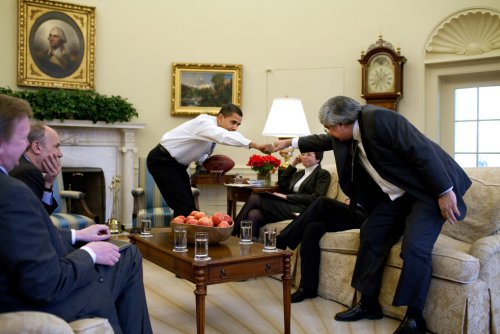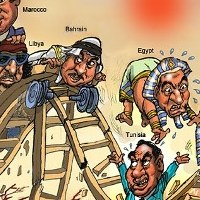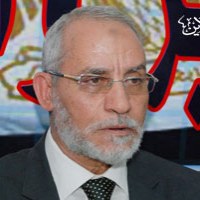![]()
Mon, March 07, 2011 | The Rubin Report | By Barry Rubin

President Barack Obama, holding a football, offers a fist-bump April 8, to senior staff member Pete Rouse, during a meeting with senior advisors in the Oval Office. (Official White House Photo / Pete Souza)
Why U.S. Policy is so Bad: An Analysis of the Current Policymaking Process
The Obama administration has a major internal split. The problem is that the people most qualified to be heard and who have the better understanding of the situation are being ignored.
The reasons include: the president’s own character; his preference for highly ideological junior people who he thinks personally loyal; the president’s mistrust of his two top policy officials, the president’s inexperience and ignorance of basic diplomatic principles (reliability, deterrence, use of power, credibility, etc.); and this administration’s desire to be different from predecessors no matter what the cost.
In one group there are those with relatively more experience and a realistic view of the situation, especially Secretary of State Hilary Clinton, Secretary of Defense Robert Gates, and the uniformed military. Reading remarks from these quarters carefully shows subtle deviations from the White House line. They tend to see Iran as more of a threat and favor(ed) alignments with existing Arab regimes while being more skeptical of change and of Islamist groups.
They seem to have been opposed to openly and quickly throwing Mubarak’s regime — not just Mubarak himself — under the bus. The president’s approach is contrary to many decades of U.S. practice.
As a student of the history of the U.S. foreign making process (my book, Secrets of State covers that story from 1789 to 1980). I’d say we now face a unique situation. The president doesn’t fully trust Clinton (a former political rival who’d like to be president and strongly criticized him in the past), Gates (a holdover from the Bush Administration), and his generals (since he mistrusts and looks down on the armed forces).
Senator John Kerry, who when I worked in the Senate was himself considered a dope by the Democratic staffers, seems to be his main foreign policy advisor at times, and Kerry once said that those who go into the army are stupid. If you think things are bad now, contemplate Clinton being fired or quitting to be replaced by Kerry.
Lacking any experience in foreign policy, Obama does not understand the institutional role or respect the experience of State and Defense. It is common for presidents to pay most attention to those officials he regards as being “on his team.” But that usually includes the secretary of state, secretary of defense, and a strong, experienced national security advisor who may act as his foreign policy advisor or even mentor.
One often sees in Clinton’s statements some different viewpoint immediately followed by lavish praise for Obama. Nevertheless, Obama does not respect the State or Defense departments, their experience, or certain traditional principles of international affairs. The State Department is liberal in politics and conservative in strategy; the White House is radical in both. State depended on Mubarak regime as a cornerstone of the U.S. regional position; Obama threw it out. State listens to Saudi fears; the White House ignores them.
Regarding the Defense Department and the military, they know that Syria and Iran are deeply involved in killing Americans in Iraq. They have to deal with scenarios of Middle Eastern war, terrorism, and maintaining basing rights. They have positive contacts with the Israeli and Turkish militaries, hearing their warnings about Islamists. The White House is not impressed by these problems and perspectives.
The alternative and dominant camp is focused in the White House itself. The current national security advisor is a relatively weak technocrat but the influentials are more junior NSC and White House staff (not, as many have thought, Ram Emanuel — formerly — and David Axelrod, both of whom focus on domestic policy) with strong ideological views and little experience in the real world. Samantha Power is a good example of these somewhat wacky and far-out views.
A prominent figure in Middle East policy is John Brennan, the president’s advisor on terrorism and apparently also on Islamism. Brennan has long been an active advocate of the “win over the moderate Islamists idea. He has been outspoken regarding Hizballah and has apparently said in private he’d like to do the same with Hamas but knows that the pro-Israel forces in Congress and elsewhere make that impossible. The former national security advisor, Jones, also had this perspective.
For some reason, the CIA, Brennan’s former agency, seems to be a key factor in pushing this view. Note that national intelligence chief Clapper’s briefings obviously sugar-coated the nature of the Muslim Brotherhood.
Dennis Ross, whose name is often mentioned by outsiders, seems to have no influence at all.
A central issue in the American policymaking process is always who in an administration has the greatest influence on the president. Usually it is either the secretary of state or the national security advisor. At present, though, the secretary of state has little influence while the national security advisor is very weak. That means the president, with his personal relatively junior White House advisors are making it up as they go along.
To understand these issues, and as evidence, read the two key articles on the subject here and here.
About the author,
Barry Rubin is Director of the Global Research in International Affairs (GLORIA) Center and editor of the Middle East Review of International Affairs (MERIA) Journal. His books include Islamic Fundamentalists in Egyptian Politics and The Muslim Brotherhood (Palgrave-Macmillan); and The Long War for Freedom: The Arab Struggle for Democracy in the Middle East, a study of Arab reform movements (Wiley). GLORIA Center site: http://www.gloria-center.org His blog, Rubin Reports, http://www.rubinreports.blogspot.com.



 RSS
RSS










Why U.S. Policy is so Bad: An Analysis of the Current Policymaking Process | #tcot #jcot #US #Israel http://j.mp/gCYErx
Why U.S. Policy is so Bad: An Analysis of the Current Policymaking Process | #tcot #jcot #US #Israel http://j.mp/gCYErx
RT @CrethiPlethi: Why U.S. Policy is so Bad: An Analysis of the Current Policymaking Process | #tcot #jcot #US #Israel http://j.mp/gCYErx
Gb SIMI: Why U.S. Policy is so Bad: An Analysis of the Current Policymaking …: As a student of the history of … http://bit.ly/hshRnj
RT @CrethiPlethi: Why U.S. Policy is so Bad: An Analysis of the Current Policymaking Process | #tcot #jcot #US #Israel http://j.mp/gCYErx
[…] Some will attribute this to exhaustion or “been there, done that.” But my assumption is that it isn’t any accident that she’s announcing this at the time of the biggest internal policy dispute of Obama’s term. In handling the Egypt crisis, it seems apparent that Obama didn’t listen to her, perhaps didn’t even consult her. On this internal conflict over foreign policymaking read here and here. […]